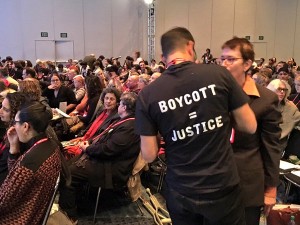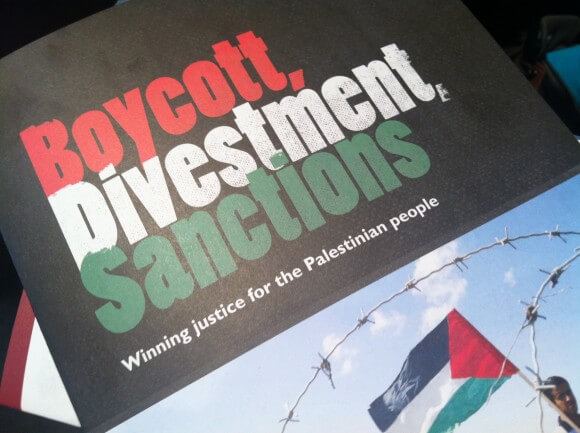By an overwhelming vote of 1,040 in favor and 136 against (88 percent), the American Anthropological Association (AAA) overwhelmingly approved a historic resolution to boycott Israeli academic institutions to honor the call of the Boycott, Divestment and Sanctions campaign (BDS). The association voted at its annual business conference in Denver, Colorado last night, becoming the largest scholarly institution in the United States to endorse the academic boycott of Israel.
The resolution (full text here) is subject to a final vote of the AAA’s 10,000 members in April. It is the largest professional organization for anthropologists.
“The core problem is Israel’s maintenance of a settler colonial regime based on Jewish supremacy and Palestinian dispossession,” the group leading the effort, Anthropologists for the Boycott of Israeli Academic institutions, said in a press release. “By supporting the boycott, anthropologists are taking a stand for justice through action in solidarity with Palestinians.”
Here is the press release:
AAA Clears Way for Final Vote on Boycott of Israeli Academic Institutions
In a historic vote Friday night, the American Anthropological Association (AAA) at its annual business meeting approved a resolution to boycott Israeli academic institutions by a vote of 1,040 in favor and 136 against. The resolution will now be forwarded to the full membership for a final vote by electronic ballot in the coming months.
The resolution enjoins the Association not to enter into any formal collaborations with Israeli academic institutions. Individual Israeli scholars may continue to participate in AAA conferences and publications. Moreover, individual AAA members will remain free to determine for themselves whether and how to apply the boycott in their own professional practice.
As heirs to a long tradition of scholarship on colonialism, anthropologists affirm, through this resolution, that the core problem is Israel’s maintenance of a settler colonial regime based on Jewish supremacy and Palestinian dispossession. By supporting the boycott, anthropologists are taking a stand for justice through action in solidarity with Palestinians.
Today’s historic result is due to over three years of organizing within the Association to educate and mobilize members to stand against Israel’s widespread, systematic, and ongoing violations of Palestinian rights, as well as to protest the complicity of Israeli academic institutions in these abuses. The vote was also a powerful act of protest against U.S. support for Israel’s actions.
With over 10,000 members, AAA is by far the largest academic association in the United States to endorse the boycott at an annual meeting. A competing resolution rejecting the boycott under the guise of promoting “engagement” was defeated by a vote of 1,173 against and 196 in favor.
The text of resolution states that AAA will honor the call from Palestinian civil society [PACBI] “to boycott Israeli academic institutions until such time as these institutions end their complicity in violating Palestinian rights as stipulated in international law”.
The Palestinian Campaign for the Academic and Cultural Boycott of Israel (PACBI), which is part of the Palestinian BDS National Committee (BNC), and oversees the academic and cultural boycott aspects of BDS, immediately released a statement expressing deep gratitude for the solidarity represented in the passage of the resolution.
“Anthropologists at the AAA conference have sent a clear message of international solidarity with Palestinians and upheld some of the best values of the profession,” PACBI co-founder Prof. Lisa Taraki, a Palestinian sociologist at Birzeit University said. “Palestinian academics, students and society at large are deeply inspired by this most effective expression of solidarity with our struggle for freedom, justice and equality. It reminds us of similar initiatives taken by academics and academic associations worldwide in the 1980s in support of the academic boycott of South Africa under apartheid.”
PACBI Steering committee member Prof. Haidar Eid, “PACBI wishes to acknowledge, with deep gratitude, the tireless, effective, strategic and principled efforts of all the academics who diligently worked for several years to achieve this remarkable victory for the academic boycott of Israel.”
Eid also made the South Africa analogy:
“We are certain that this outstanding expression of support for the Palestinian-led BDS movement will further galvanize academics to pursue the institutional boycott of Israel. As in the South African anti-apartheid struggle, the boycott of complicit institutions will significantly contribute to the long march towards Palestinian liberation and self-determination.”
According to PACBI, Israeli academic institutions are particularly targeted due to their “persistent and deep complicity in planning, implementing and whitewashing crimes against the Palestinian people by Israel’s regime of occupation, settler-colonialism and apartheid.”
As Nadia Abu El-Haj, professor in the Departments of Anthropology at Barnard College and Columbia University, explains:
Israeli universities take political positions that support the status quo all the time. Sometimes taking political positions involves making declarations of support: [Tel Aviv University]..released a statement on July 24, 2014 in support of “all the security forces who are working to restore quiet and security to Israel,” that is, the armed forces fighting the Gaza war. More often, taking a political position is structural in form: building universities on confiscated Palestinian land; developing weapons systems with the Israeli military; formulating the Dahiya doctrine, used in Lebanon in 2006 and Gaza in 2014, that calls for the use of disproportionate force to destroy civilian property and infrastructure; providing financial and academic support for Israeli soldiers…; giving course credit for classes in hasbara, that is, learning social media strategies designed to justify Israeli policies under the guise of “public diplomacy;” and more routinely, discriminating against Palestinian students in their midst. [2]
Yes, Israeli universities are not alone in helping to develop military technologies and strategies or in reproducing the forms of violence that characterize the states and societies of which they are a part. And if there were a global political movement calling for a boycott of U.S. universities to protest the violence the U.S. unleashes on the world, I would stand in solidarity with that call… In supporting a boycott of Israeli academic institutions, I am responding to a call from Palestinian civil society that we recognize the integral role that Israeli universities play in sustaining the Israeli state and its belligerent regime. And I am responding to that call because I recognize that as a professor at a U.S. university I bear a particular political and ethical responsibility: The “exceptional” relationship between the U.S. and Israel demands that I take a stand.
The “Background for the Resolution” text reads:
“An academic boycott has an important role to play in pressuring Israel to end these abuses. Israel stands apart from other states that routinely engage in mass human rights abuses due to the level of support it receives from the United States. At the governmental level, Israel is the leading recipient — in absolute and per capita terms — of official U.S. aid, much of which goes to purchase weapons used to oppress, maim, and kill Palestinians. More than with any other country, the U.S. regularly thwarts any concerted action at the United Nations to curb Israel’s abuses, in the face of near-universal condemnation by the international community. Furthermore, Israel enjoys extensive ties with academic and cultural institutions in the U.S. As a result, Israel depends on the U.S. not only for diplomatic and military aid, but also for its sense of legitimacy in the face of international condemnation.
The academic boycott is an act of protest against Israel’s violations and an act of solidarity with our Palestinian colleagues. It is also a rejection of the support that the U.S. government provides Israel, enabling it to act with impunity. Israel’s dependence on the U.S. makes it vulnerable to popular pressure, such as boycotts, from U.S. organizations. Boycott functions by making complicity with the status quo burdensome for Israeli academic institutions. It provides a concrete and proven way that scholars can participate in amplifying that pressure.”
Source Article from http://mondoweiss.net/2015/11/anthropologists-overwhelmingly-conference
Related posts:
Views: 0
 RSS Feed
RSS Feed

















 November 21st, 2015
November 21st, 2015  Awake Goy
Awake Goy 


 Posted in
Posted in  Tags:
Tags: 
















